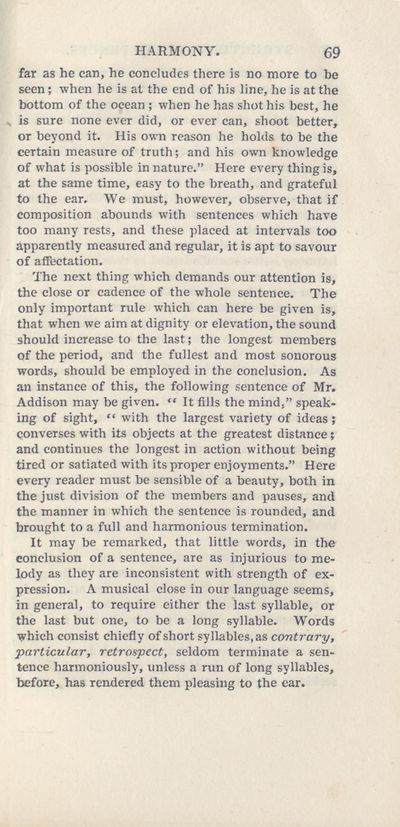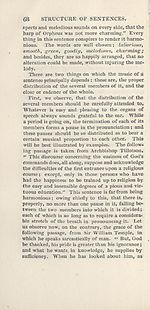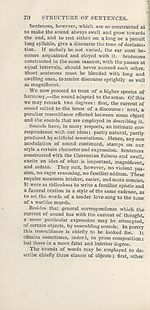Education > Essays on rhetoric
(97)
Download files
Complete book:
Individual page:
Thumbnail gallery: Grid view | List view

HARMONY.
69
far as he can, he concludes there is no more to be
seen; when he is at the end of his line, he is at the
bottom of the ocean ; when he has shot his best, he
is sure none ever did, or ever can, shoot better,
or beyond it. His own reason he holds to be the
certain measure of truth; and his own knowledge
of what is possible in nature.” Here every thing is,
at the same time, easy to the breath, and grateful
to the ear. We must, however, observe, that if
composition abounds with sentences which have
too many rests, and these placed at intervals too
apparently measured and regular, it is apt to savour
of affectation.
The next thing which demands our attention is,
the close or cadence of the whole sentence. The
only important rule which can here be given is,
that when we aim at dignity or elevation, the sound
should increase to the last; the longest members
of the period, and the fullest and most sonorous
words, should be employed in the conclusion. As
an instance of this, the following sentence of Mr.
Addison may be given. “ It fills the mind,” speak¬
ing of sight, with the largest variety of ideas;
converses with its objects at the greatest distance;
and continues the longest in action without being
tired or satiated with its proper enjoyments.” Here
every reader must be sensible of a beauty, both in
the just division of the members and pauses, and
the manner in which the sentence is rounded, and
brought to a full and harmonious termination.
It may be remarked, that little words, in the
conclusion of a sentence, are as injurious to me¬
lody as they are inconsistent with strength of ex¬
pression. A musical close in our language seems,
in general, to require either the last syllable, or
the last but one, to be a long syllable. Words
which consist chiefly of short syllables, as contrary,
particular, retrospect, seldom terminate a sen¬
tence harmoniously, unless a run of long syllables,
before, has rendered them pleasing to the ear.
69
far as he can, he concludes there is no more to be
seen; when he is at the end of his line, he is at the
bottom of the ocean ; when he has shot his best, he
is sure none ever did, or ever can, shoot better,
or beyond it. His own reason he holds to be the
certain measure of truth; and his own knowledge
of what is possible in nature.” Here every thing is,
at the same time, easy to the breath, and grateful
to the ear. We must, however, observe, that if
composition abounds with sentences which have
too many rests, and these placed at intervals too
apparently measured and regular, it is apt to savour
of affectation.
The next thing which demands our attention is,
the close or cadence of the whole sentence. The
only important rule which can here be given is,
that when we aim at dignity or elevation, the sound
should increase to the last; the longest members
of the period, and the fullest and most sonorous
words, should be employed in the conclusion. As
an instance of this, the following sentence of Mr.
Addison may be given. “ It fills the mind,” speak¬
ing of sight, with the largest variety of ideas;
converses with its objects at the greatest distance;
and continues the longest in action without being
tired or satiated with its proper enjoyments.” Here
every reader must be sensible of a beauty, both in
the just division of the members and pauses, and
the manner in which the sentence is rounded, and
brought to a full and harmonious termination.
It may be remarked, that little words, in the
conclusion of a sentence, are as injurious to me¬
lody as they are inconsistent with strength of ex¬
pression. A musical close in our language seems,
in general, to require either the last syllable, or
the last but one, to be a long syllable. Words
which consist chiefly of short syllables, as contrary,
particular, retrospect, seldom terminate a sen¬
tence harmoniously, unless a run of long syllables,
before, has rendered them pleasing to the ear.
Set display mode to:
![]() Universal Viewer |
Universal Viewer | ![]() Mirador |
Large image | Transcription
Mirador |
Large image | Transcription
| Antiquarian books of Scotland > Education > Essays on rhetoric > (97) |
|---|
| Permanent URL | https://digital.nls.uk/113760656 |
|---|
| Description | Thousands of printed books from the Antiquarian Books of Scotland collection which dates from 1641 to the 1980s. The collection consists of 14,800 books which were published in Scotland or have a Scottish connection, e.g. through the author, printer or owner. Subjects covered include sport, education, diseases, adventure, occupations, Jacobites, politics and religion. Among the 29 languages represented are English, Gaelic, Italian, French, Russian and Swedish. |
|---|

